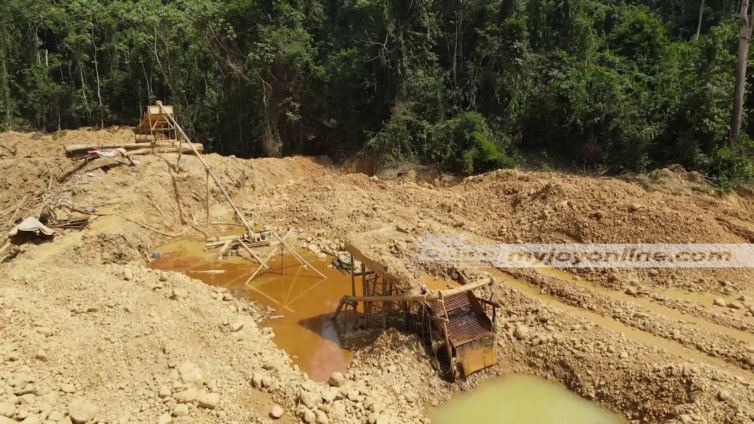In the lush landscapes of Ghana, where the wealth of the land feeds the economy, the bane of illegal mining has cast long shadows over environmental sustainability and economic justice. In response to this crisis, former President John Dramani Mahama recently addressed the 3rd Annual Transformational Dialogue on Small-Scale Mining at the University of Energy and Natural Resources in Sunyani, laying out a comprehensive blueprint aimed at transforming the mining sector into a model of sustainability and prosperity.
Mahama's plan: a framework for sustainable development
John Dramani Mahama’s vision for small-scale mining is not just a policy proposal; it is a call to arms against environmental degradation and economic disparity. By proposing to establish district mining offices, amend the Minerals and Mining Act, and incorporate modern technologies and educational initiatives, Mahama is targeting the root causes of the issues plaguing the mining sector.
The former president's plan to decentralize the issuance of mining licenses through district offices promises to enhance transparency and reduce bureaucratic red tape, thus speeding up legal compliance and operational efficiency. This approach not only aids miners who seek to operate within the legal framework but also promises a boost in employment opportunities, particularly benefiting the youth in mining communities.
Technological Integration and Environmental Stewardship
Critically, Mahama emphasizes the adoption of advanced technologies such as AI to monitor mining activities. This move could be a game-changer in enforcing regulations and ensuring that mining operations do not encroach on prohibited areas like water bodies and protected forests. Such technologies will provide the government with real-time data, facilitating better decision- making and swift action against violators.
Moreover, the proposal to involve graduates and professionals in the mining process is particularly commendable. By leveraging the expertise of the country’s educated youth, Ghana can ensure that mining operations are not only economically viable but also environmentally sustainable.
A collective effort for a greener future
Mahama’s vision extends beyond mining; it is a vision for environmental restoration and social responsibility. The initiatives to rehabilitate degraded lands and clean polluted water bodies through partnerships with local communities, the government, and the private sector reflect a holistic approach to the problems at hand. These efforts are not merely corrective but are preventive measures that aim to sustain Ghana’s natural wealth for future generations.
Why this matters
For too long, the small-scale mining sector in Ghana has operated under the shadow of illegality and environmental misconduct. The consequences have been dire: poisoned rivers, barren lands, and a populace disillusioned with the promises of natural wealth. Mahama’s proposals offer a chance to reset the narrative, to turn small-scale mining from a source of peril into a paragon of prosperity.
The path forward
As a nation, the time to act is now. We must rally behind these initiatives, push for their implementation, and hold accountable those in power to ensure that these are not just empty promises. This is not merely about policy change; it is about changing the fate of our environment and improving the lives of all Ghanaians. Let us support John Dramani Mahama’s vision and take decisive steps towards a sustainable and prosperous future in mining.
We must embrace this plan not only as a method of extraction but as a mission of restoration and rejuvenation. This is our call to action for the government, for environmental advocates, and for every Ghanaian. The success of our mining sector and the health of our environment are inextricably linked. By supporting these proposed changes, we are investing in a greener, more equitable Ghana.
Theophilus Berchie Mphil. Environmental Science - Student-KNUST
Latest Stories
-
We’ll cut down imports and boost consumption of local rice and other products – Mahama
2 hours -
Prof Opoku-Agyemang donates to Tamale orphanage to mark her birthday
3 hours -
Don’t call re-painted old schools brand new infrastructure – Prof Opoku-Agyemang tells gov’t
3 hours -
Sunon Asogli plant will be back on stream in a few weeks – ECG
3 hours -
ECOWAS deploys observers for Dec. 7 election
4 hours -
73 officers commissioned into Ghana Armed Forces
4 hours -
Impending shutdown of three power plants won’t happen – ECG MD
4 hours -
Ghana shouldn’t have experienced any ‘dumsor’ after 2017 – IES Boss
4 hours -
Lamens flouted some food safety laws in re-bagging rice – Former FDA Boss Alhaji Hudu Mogtari
5 hours -
Afcon exit: Our issue is administrative failure and mismanagement, not lack of talent – Saddick Adams
5 hours -
WAPCo to commence major pipeline maintenance and inspection from November 25
5 hours -
CEO of Oro Oil Ghana Limited Maxwell Commey listed among the 100 Most Influential People Awards, 2024
6 hours -
Power crisis: Amandi is off due to maintenance, not debt – ECG Boss
6 hours -
Votes cast for late Akua Donkor to be declared invalid – Electoral Commission
6 hours -
You can’t keep “incompetent” Otto Addo for the long term – Countryman Songo
6 hours

